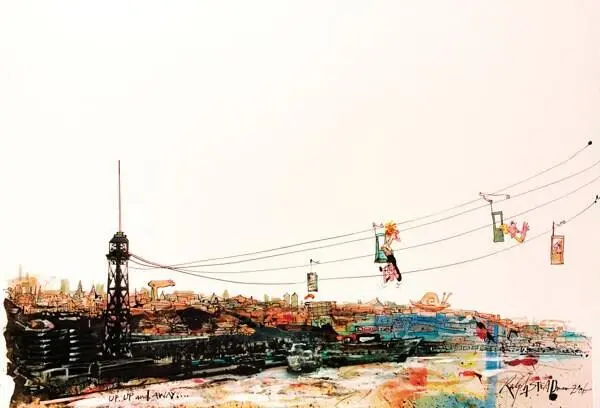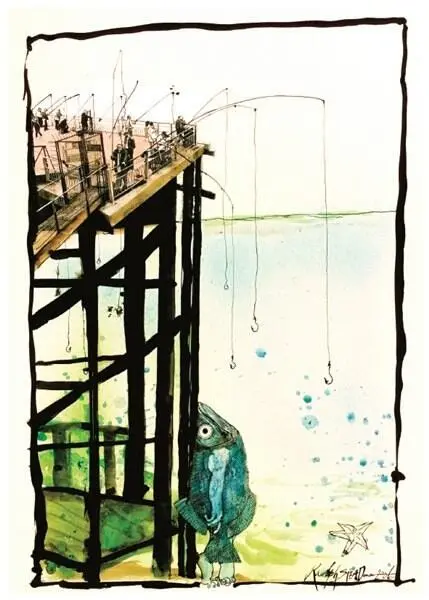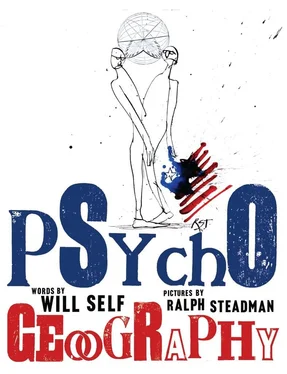Through the warp and weft of memory — thick threads of confabulation, thin filaments of recollection — we are back in Barcelona. My daughter Madeleine and I, walking down through the Jardins de Miramar, the city spread out beneath us, a curiously homely collection of blocks and spires. I’m a little wobbly on my pins, overcome by the adrenalin rush of having survived a terrifying ordeal: the cable car ride across the harbour.
I’d spotted the cable car a couple of days before, when we stepped out of our hotel on Paral-lel. Spotted the curved line the cable drew across the azure sky, spotted the winking jewel of the car, and blurted out, ‘Ooh, look, there’s a cable car’, while my internal voice screamed, ‘Don’t mention it! She’ll want to go on it right away!’ And, of course, she did, because Maddie is thirteen and has absolutely no fear of heights, whereas I am forty-four and suffer tachycardia if I have to fetch a suitcase down from the attic.
I held off for a couple of days, whining all the time, while she expertly coaxed me towards our doom, saying: ‘We don’t have to go if you don’t want to.’ Bringing up father, eh, isn’t that way it’s always been? So, we walked along the front at Barceloneta, past families cavorting on the packed sand, past a lurid, cartoon poster of a man in fish-scale swimming trunks wrestling with a giant cigarette butt; all the while the debate continued and the wind whipped in off the sea.

Up ahead lowered the Torre de St Sebastià, a horrible, workaday Martian tripod, poised on the dockside and tethered by the cable to its master, the Torre Jaume 1. I could see the ludicrous little death box inching between them, dangling over the municipal void. I could imagine its bucking motion. I felt as I always feel when about to embark on these mundane and fearful transports: I am a prosaic character in a Dostoevsky novel, edited out of an early draft. I cast my maddened eye about me at the world I am about to leave behind, and swear to myself that, should I survive the ordeal, I will never again take for granted this fresh breeze, this sparkling sunlight, that Volvo showroom.
At the base of the tower, where you buy your tickets before entering the lift, someone had added a graffito to the sign portraying the cable car, so that it appeared to be depended from an enormous, hypodermic syringe. My heart shifted up another gear. But if it was windy at sea level, 300 feet up on the open platform Aeolus was playing frantic bebop. I became cringingly garrulous in order to combat my anxiety. I chatted up two elderly American women; a genial, bald Italian with a camcorder; a Scandinavian honeymoon couple. But it was no good: I was still absolutely certain that as soon as I climbed aboard the cable car (which I could now see was absurdly tiny, a phone box in space), I would vomit and faint simultaneously.
Luckily the camera came to the rescue. I’d been snapping stills the whole way along the promenade; now, as the cable car lurched away from the tower, I began shooting full-motion. It worked: as I was looking at a tiny little image of the drop, obviously I couldn’t possibly be above it. That wasn’t a real waiter setting up a table on the upper deck of that concrete cruise liner, the Barcelonan World Trade Center — but a Hollywood extra. Maddie’s hair flared around her face as she craned through the open windows of the car, but I felt no neurotic terror, I simply panned about me, a Stanley Kubrick of a tourist, shooting a Vietnam war movie in Docklands.
When the cable car finally reached the Plaça de l’Armada and we clambered out, I felt as fluttery as an angel. I had survived! I was a changed man. I would be kind to all from henceforth! As we trudged back down to the city we entered another circle of hell. In among the scrubby trees were discarded syringes, DIY crack pipes, a human turd poised on a sheet of cardboard. Scattered about were official-looking papers. I stopped, picked them up. They were the graduation certificates of a certain Massimiliano X from the Accademia di Belle Arti in Rome. Massimiliano had been studying scenografia and regia, then had come to Barcelona for an extension course — this much the papers told me. But had he made the crack pipe and set fire to his nascent career? Or had some junky stolen his bag, then scattered the papers?
I resolved to take them home to London with me. There was an address in Pedara, I would write to Massimiliano and find out his story. I owed it to him, as one film director to another.
The river: it enfolds us in its icy embrace. Superficially, it isn’t turbid, only an insistent, coiled, supremely powerful inertia. Stop swimming for an instant, and I can feel it push me downstream at a steady 2 mph. There are seven of us abreast, holding to the centre of the Avon; the river is chilly with the run-off of the August rainstorms, and our engagement with the water is profound and elemental. The Avon takes us all and subsumes us to its own relentless pulsion. The heads of my fellow swimmers are otter-sleek as they dip and rise. We are no longer human, I feel, as we contemplate the grassy banks, only understudies for some yet-to-be-realised production of The Wind in the Willows .
Charles — whose land runs along the bank — chooses this moment, with supreme tact, to tell us about the 450-lb pike he’s recently seen stuffed in a local museum. A pike caught in this very river. At once our white legs and whiter bellies are lures flickering beneath the surface; the ancient, bony fish are rising from the river bed, intent on teaching us a lesson, sending us back to our tiled paddling pools with a vengeance. We do not belong here — we belong there, minus a limb. Or two.
It’s been a summer of wild-water swimming for me. As middle age advances I feel myself more and more drawn to plunging into lakes, tarns, rivers and, of course, the sea. The wild-water swimmers’ guru was the writer and broadcaster Roger Deakin, who very sadly died last month, aged only sixty-three. His book Waterlog told the story of his peculiar, liquid odyssey across Britain, splashing off the Scillies, plashing on Dartmoor, breasting the chalk-bed stream of the Itchen, tumbling down watery chutes in the Yorkshire Dales. It’s a beautiful, melancholic and yet intensely celebratory account of one man’s total immersion in our environment and I urge you all to read it.

Deakin wasn’t just a wild-water swimming enthusiast — he was a campaigner for the rights of us all to roam as freely in liquid as we would like to on land. Agencies, councils, fishing clubs and landowners are all intent on barring the swimmer from the swim. They scaremonger with Weil’s disease, a nasty rat-borne malaise which can be avoided with simple precautions, such as not swimming with open wounds on your body. However, the risks of ‘rough’ swimming are obvious: fish hooks, currents, whirlpools, cramps, pike and weed — a gamut of challenges which healthily affirm that you are where you ought to be: in the welter of the world, not a place apart.
I’ve swum this year in the Avon, the Thames, Loch Lomond; and in the sea, off the Orcadian island of Westray, Hurst Beach in the Solent, Barcelona, Ibiza, and many times at Brighton. The practice never jades me, each fresh dousing only invigorates. The land seen from wild water is another country, waiting to be rediscovered as you stagger ashore, while the water itself cradles you in its diluvian embrace.
Читать дальше














